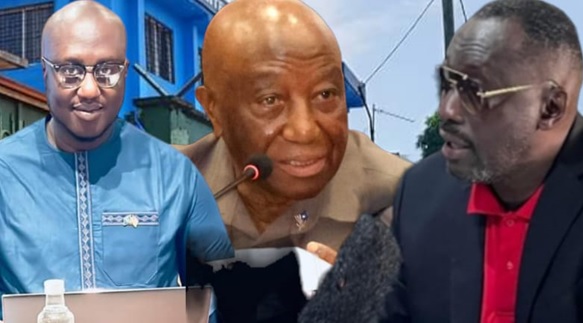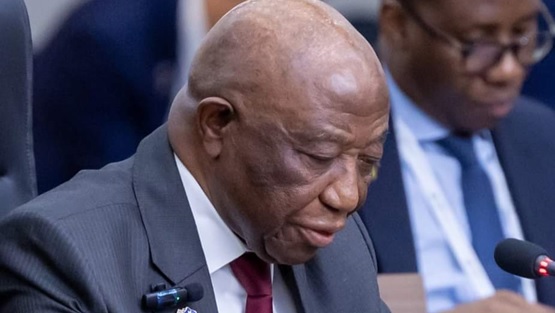MONROVIA – The internal conflict between Liberia Drug Enforcement Agency (LDEA) Directors General Abraham Kromah and Deputy Director General of Operations Hassan Fadiga shows no signs of abating. The two high-ranking officials, trusted aides of President Joseph Boakai, have been at odds, trading accusations that have now spilled into the public arena.
In a press conference held at LDEA headquarters in Monrovia on Monday, June 3, 2024, Director Kromah addressed several issues, leading to a swift response from Deputy Director Fadiga. On social media, Fadiga vehemently denied Kromah’s claims that he had brandished a weapon, marking the latest development in a growing feud.
“I did not brandish any weapon,” Fadiga asserted. “As a seasoned law enforcement professional with over a decade of experience, it is against my principles to engage in such behavior. However, I was unfortunately attacked by Kromah’s thugs.” This statement has only deepened the controversy surrounding the LDEA’s internal dynamics.
Fadiga accused Kromah’s personal security team, composed of former ULIMO-K rebel fighters, of assaulting him in the director’s office. According to Fadiga, these individuals restrained him, took hold of his firearm, and confiscated three of his phones. He claimed that the assailants deleted a crucial recording of the incident from one of his phones, but he managed to recover the video from a backup account, thanks to the phone’s face recognition feature.
The ongoing dispute between Kromah and Fadiga has sparked significant public interest and reaction. Varney Jarsey, a commentator on social media, questioned the criticism of employing former rebels at the LDEA, pointing out that other ex-fighters hold government positions without similar backlash. “You have Zoe Pennie, Edwin Snow, Thomas Yaya Nimley, Prince Johnson, Yekeh Kolubah, etc., serving at the first branch of government and nothing wrong with that but that AB Kromah bringing EX LURD rebels,” he remarked.
Boima Kamara criticized President Boakai for appointing Kromah, describing him as a former rebel leader unfit for administrative responsibilities. “JNB just foolish. Why will you give an administrative job to a rebel leader like AB Kromah? That guy only knows how to take laws into his hands,” Kamara stated, reflecting a segment of public opinion that sees Kromah’s past as a significant liability.
Meanwhile, David Karyah Constance Jr. expressed broader concerns about the country’s spiritual and societal issues, suggesting that Liberia is undergoing serious spiritual problems that need urgent attention. This perspective highlights the complexity of the issues facing Liberia beyond the immediate conflict at the LDEA.
Arthur B. Oddman offered a different viewpoint, emphasizing that former fighters are Liberian citizens who have the right to work anywhere in the country, including in government roles. “Former fighters are Liberians; they have the right to work anywhere in Liberia, even in government,” Oddman argued, adding another layer to the public debate on the matter.
George B.K. Cooper II pledged support for Fadiga, stating, “We will wait to hear the truth and stand with you. Director Kromah is not more Liberian than you and cannot scare you from Liberia by using his ex-rebel general connection.” Cooper’s statement underscores the divided loyalties and the charged atmosphere surrounding the LDEA leadership.
The infighting has also drawn the attention of Senator Abraham Darius Dillon of Montserrado County, who called the situation at the LDEA “embarrassing” and demanded immediate action. He suggested that either one or both officials should be replaced to restore order, adding political pressure on the administration to address the issue promptly.
As the tension escalates, the spotlight turns to President Boakai, who holds the constitutional authority to appoint and dismiss officials. The resolution of this conflict rests on his decisive action to bring stability to the LDEA and ensure its effective functioning in combating drug-related issues in Liberia. The ongoing turmoil not only hampers the agency’s operations but also raises broader questions about governance and accountability in Liberia.
President Boakai’s response to this crisis will be closely watched by the public and political observers alike. His decision could set a precedent for how similar conflicts are managed in the future and will undoubtedly impact his administration’s reputation for handling internal disputes. The nation awaits his next move as the situation at the LDEA remains tense and unresolved.






